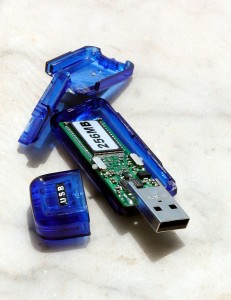
The Law of Portable Device Breaches says that the risk of losing a device, and the information thereon, is directly proportional to its portability. Licensed from Stock Exchange
This post is the fourth in a series about data breaches you can prevent. We’ve covered Phones and Personal Computing Devices , Your Browser, and Your Inbox. Here we’ll explore Your Thumb and External Drives.
Just about anything that can store information can be used to store sensitive personal information. Whether you use an external drive to back up sensitive data, or use a thumb drive to transfer large files from one computer to another. The Law of Portable Device Breaches (which I just made up) says that the risk of losing a device, and the information thereon, is directly proportional to its portability. In real terms, this extremely scientific law means that you’re more likely to leave your cell phone at the bar than your desktop computer.
Readers of this blog no doubt assiduously delete sensitive information from portable devices on a regular basis. But simply deleting files doesn’t actually erase the data. Just like cranberry juice on white linen, personal information stains hard drives.
Simply throwing a stained table cloth in the washing machine won’t remove cranberry juice stains. Likewise, simply hitting the “delete” key and emptying the recycle bin won’t completely remove personal information from your thumb or external hard drive. The hard drive usually remains stained with the sensitive information, which may be recovered until you proverbially “scrub” the drive. This scrubbing is called “shredding” the file, and typically requires at least a three-step deletion process whereby each byte is individually overwritten.
You should always think twice before copying sensitive files, such as tax documents, pictures, passwords, or confidential documents to removable media. Regularly scan removable media forgotten personal information so that when you leave your thumb drive in the taxicab, you don’t accidentally cause your own data breach.
Article first published on Security Catalyst.